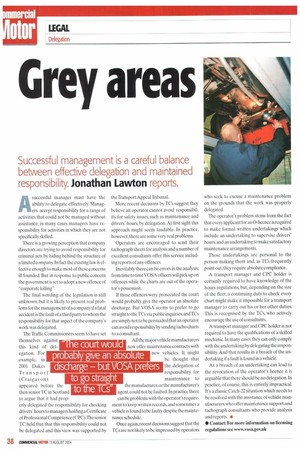Grey areas
Page 40

If you've noticed an error in this article please click here to report it so we can fix it.
Successful management is a careful balance between effective delegation and maintained
responsibility. Jonathan Lawton reports.
Asuccessful manager must have the ability to delegate effectively. Managers accept responsibility for a range of activities that could not be managed without assistance; in many cases managers have responsibility for activities in which they are not specifically skilled.
There is a growing perception that company directors are trying to avoid responsibility for criminal acts by hiding behind the structure of a limited company. In fact the existing law is effective enough to make most of these concerns ill founded. But in response to public concern the government is set to adopt a new offence of "corporate killing".
The final wording of the legislation is still unknown, but it is likely to present real problems for the management of a company if a fatal accident is the fault of a third party to whom the responsibility for that aspect of the company's work was delegated.
The Traffic Commissioners seem to have set themselves against this kind of delegation. For example, in 2001 Dukes Transport (Craigavon) appeared before the then senior TC in Scotland to argue that it had properly delegated the responsibility for checking drivers' hours to managers holding a Certificate of Professional Competence (CPC).The senior TC held that that this responsibility could not be delegated and this view was supported by the Transport Appeal Tribunal.
More recent decisions by TCs suggest they believe an operator cannot avoid responsibility for safety issues, such as maintenance and drivers' hours, by delegation. At first sight this approach might seem laudable. In practice, however, there are some very real problems.
Operators are encouraged to send their tachograph sheets for analysis and a number of excellent consultants offer this service including reports of any offences.
Inevitably there can be errors in the analysis; from time to time VOSA officers will pick up on offences while the charts are out of the operator's possession.
If these offences were prosecuted the court would probably give the operator an absolute discharge. But VOSA seems to prefer to go straight to the TCs via public inquiries, and TCs are simply not to be persuaded that an operator can avoid responsibility by sending tacho charts to a consultant.
All the major vehicle manufacturers now offer maintenance contracts with new vehicles. It might be thought that the delegation of responsibility for maintenance to the manufacturer, or the manufacturer's agent, could not be faulted. In practice there can be problems with the operator's requirement to keep written records, and sometimes a vehicle is found to be faulty despite the maintenance schedule.
Once again, recent decisions suggest that the TCs are not likely to be impressed by operators who seek to excuse a maintenance problem on the grounds that the work was properly delegated.
The operator's problem stems from the fact that every applicant for an 0-licence is required to make formal written undertakings which include an undertaking to supervise drivers' hours, and an undertaking to make satisfactory maintenance arrangements.
Those undertakings are personal to the person making them and, as TCs frequently point out, they require absolute compliance.
A transport manager and CPC holder is certainly required to have knowledge of the hours regulations, but, depending on the size of the fleet, a continuing duty to check every chart might make it impossible for a transport manager to carry out his or her other duties. This is recognised by the TCs, who actively encourage the use of consultants.
A transport manager and CPC holder is not required to have the qualifications of a skilled mechanic. In many cases they can only comply with the undertaking by delegating the responsibility. And that results in a breach of the undertaking if a fault is found in a vehicle.
As a breach of an undertaking can lead to the revocation of the operator's licence it is arguable that there should be no delegation. In practice, of course, this is entirely impractical. It's a classic Catch-22 situation which needs to be resolved with the assistance of vehicle manufacturers,who offer maintenance support, and tachograph consultants who provide analysis and reports. • • Contact For more information on licensing regulations see wvvw.vosa.gov.uk


































































































































































































